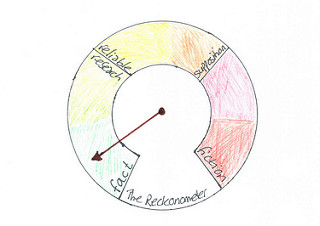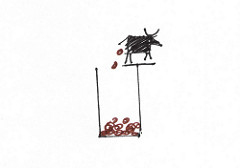Citation needed or Where is the reckonometer?
I was watching Pompeii: The Mystery of the People Frozen in Time the other night, and there seemed like there was a whole lot of reckoning going on. One of the things I like about wikipedia is the provision of references - it’s up to me whether I choose to follow up on them obviously, but they’re there. Or they’re not, in which case they can be flagged.
I want a way to have references in certain types of tv programme - things like history programmes, or documentaries. So that I know how much I can believe and which bits I should be more sceptical about. I don’t have the time, nor inclination, to cross-reference every fact in every programme.
In this specific instance, the Pompeii programme, there was a finely detailed timeline description of what happened. This was based, they said later on in the programme, on the two letters from Pliny the Younger to Cornelius Tacitus. A quick google brings up a couple of places showing the contents of the letters, of which this one is referenced as being taken from a Penguin translation by Betty Radice. These letters aren’t that detailed in terms of times, and yet the programme confidently told us that at 2am this happened, and at 6am this other thing happened. From the first letter
Meanwhile on Mount Vesuvius broad sheets of fire and leaping flames blazed at several points, their bright glare emphasised by the darkness of night.
and
Elsewhere there was daylight by this time, but they were still in darkness
and from the 2nd letter
At last the darkness thinned and dispersed into smoke or cloud; then there was genuine daylight, and the sun actually shone out, but yellowish as it is during an eclipse.
As an aside, one of my favourite parts of the first letter is
I will say no more, except to add that I have described in detail every incident which I either witnessed myself or heard about immediately after the event, when reports were most likely to be accurate. It is for you to select what best suits your purpose, for there is a great difference between a letter to a friend and history written for all to read.
and from the second
Of course these details are not important enough for history, and you will read them without any idea of recording them; if they seem scarcely worth putting in a letter, you have only yourself to blame for asking them.
and I do realise that the fact that these letters survived is incredible, and reading them is an honour. Oh, and Pliny the Younger, just for the record, they were definitely worth putting into a letter.
What I want, I think, is either a red button/web site feature that allows me to get at the references if I want to. Or alternatively, a reckonometer to give me an indication of when we’re heading towards unverified and/or made up territories.
Something a bit like this

I envisage the needle moving throughout the programme, moving from fact to fiction via reliable research and supposition at appropriate points.
Richard had an alternative, more aggregated, suggestion which I drew for him!

I have no idea what happens to the bull when the receptacle gets filled up mind you…